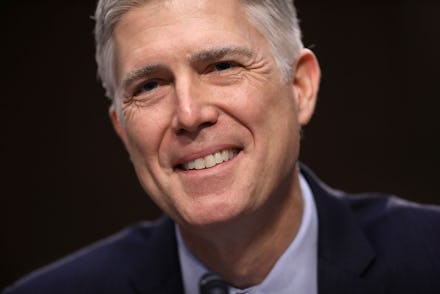Neil Gorsuch Confirmation Hearing: 3 biggest takeaways

Supreme Court nominee Neil Gorsuch faced a marathon grilling from the Senate Judiciary Committee on Tuesday as he goes through the vetting process for a spot on the country's highest court.
Senators pressed Gorsuch on everything from whether he would make decisions independent of President Donald Trump — who nominated him to the court — to his thoughts on major issues including abortion rights, gun control and campaign finance laws.
Here are the three biggest takeaways from Tuesday's more than 11-hour-long session.
There were no major fireworks.
Democrats hoping for viral moments to cause problems for Gorsuch's confirmation chances likely came away from Tuesday's hearing sorely disappointed. In fact, the most buzz worthy moments of the hearing painted Gorsuch in a positive light for the left.
Gorsuch made the case that he would never make legal decisions at the behest of Trump. That includes overturning Roe v. Wade — the landmark abortion case Trump said he would appoint SCOTUS judges to overturn.
Gorsuch also cleared the air of an allegation from a former student, who claimed the judge said women abused maternity leave policies in the workplace. Gorsuch said he merely asked his class how many people had been asked inappropriate questions about their family planning in the workplace.
"I am shocked every year how many young women raise their hand. It's disturbing to me," Gorsuch said in an exchange with Sen. Dick Durbin (D-IL).
"I am shocked it still happens every year that I get women, not men, raising their hand at the question," Gorsuch added. "Thank you for the question to clarify that, Senator."
Gorsuch was tight-lipped on his personal positions.
Democratic senators tried their best to get Gorsuch to reveal his personal positions on everything from gun rights, abortion, money in politics, same-sex marriage and Trump's Muslim ban.
But Gorsuch refused each time.
"I'm not going to say anything here that would give anybody any idea how I'd rule in any case that could come before the Supreme Court or my court, the 10th Circuit. It would be grossly improper of a judge to do that. It would be a violation of the separation of powers and judicial independence if someone sitting at this table, in order to get confirmed, had to make promises or commitments about how they'd rule in a case that's currently pending and likely to make its way to the Supreme Court."
"My personal views belong over here, I leave those at home," Gorsuch added.
His path to confirmation is all-but-clear.
With nothing damaging emerging from Gorsuch's confirmation hearing, his chances at confirmation grew stronger.
Senate Majority leader Mitch McConnell said Tuesday he expects the Senate will vote on Gorsuch's nomination in early April, before the Senate recesses on April 10 for Passover and Easter. McConnell hinted he'd even change rules to help confirm Gorsuch by triggering the so-called "nuclear option."
Currently, Senate rules state that 60 votes are needed to end debate on a Supreme Court nominee. The nuclear option would require a simple majority of senators to end debate. And since Republicans currently have the majority, with 52 GOP senators, Gorsuch could be confirmed without a single Democratic vote.